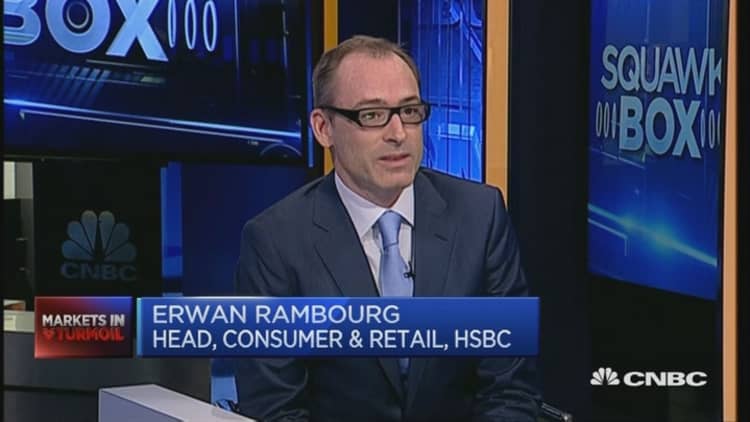Retailers in Hong Kong preparing to welcome Chinese mainland tourists over the Lunar New Year festive period face a real crisis: Canny shoppers don't think the special administrative region is cool enough.
HSBC's global co-head of consumer and retail research, Erwan Rambourg, said luxury goods are now cheaper in other markets, bringing the wealthy, sophisticated Chinese travelers to places such as Japan, Korea, and Australia.
"There were a lot of attractions in Hong Kong for mainlanders to come in and purchase here," Rambourg told CNBC's "Squawk Box". "It used to be cheaper than a lot of other places in the region. That's not the case anymore, given the strength of the Hong Kong dollar."
The Hong Kong dollar is pegged to the U.S. dollar, which implies if the latter strengthens, the former follows.

"Price arbitrage doesn't work anymore [in Hong Kong]," Rambourg said. "It's actually cheaper to buy in Seoul, in Tokyo, and elsewhere."
Between Hong Kong and Japan, and the strength of their respective currencies, he said "the difference is you reclaim VAT [Value-added tax] when you go to Japan," which makes luxury goods slightly cheaper there.
Retail sales were also battered in Hong Kong as a result of lower consumer spending, mostly from mainland Chinese tourists. Sales were down 8.5 percent on-year in December to HK$43.7 billion ($5.62 billion) in value terms, the biggest percentage decline since January 2015. In volume terms, sales declined by 6.1 percent.
Hong Kong's lack of entertainment and diversity outside of shopping is also an issue as it sends wealthy tourists to other, more exciting locations, added Rambourg.
A quick look at tourism numbers in Hong Kong show tourist arrivals fell 2.5 percent in 2015 to 59.32 million.
What do Chinese mainlanders buy?
Chinese mainlanders, who comprise a bulk of Asia's luxury consumers, purchase mostly personal items such as handbags and apparels, according to David Dubois, an assistant professor of marketing at business school INSEAD.
"This is because of the importance of luxury as a social signal, which puts focus on a product's conspicuous features - example, it's logo," Dubois told CNBC by email. "The strong gift-giving culture also fuels such a drive for highly recognizable goods."
Rambourg noted in a recent report there are several factors that propel Chinese shoppers to make their luxury purchases abroad, instead of at home. Consumption taxes, moves in the foreign exchange market, and price differences in different geographies for a single product are motivations for travel.
Most luxury companies have wide pricing discrepancies, the report noted, and on average, prices in mainland China are at a 37 percent premium compared to euro zone prices.
For example, data compiled by HSBC show a Hermes plain silk twill tie costs 160 Euros ($177.69) in France and Italy; it costs 1,600 Yuan in China ($243.37) - a 36.9 percent premium -, $180 in the United States, 25,920 yen ($219.74) in Japan, and HK$1,650 ($211.79) in Hong Kong.
HSBC also calculated how different products cost across regions relative to the euro. Here's how a few of them stack up:
| Product | France/Italy | Japan | China | Hong Kong | Singapore |
|---|---|---|---|---|---|
| Burberry Trench coat | 100 | 110 | 131 | 114 | 112 |
| Dior Lady Dior bag | 100 | 121 | 135 | 125 | 118 |
| Rolex Oyster watch | 100 | 104 | 148 | 139 | 113 |
Many brands are dealing with price gaps through new products whose prices will not vary much among regions. "The Prada brand, for instance, is set to launch collections for the spring, which will have prices in mainland China at a [estimated] 10 [percent] premium to Italy vs. a current [estimate of] 40 [percent]," the HSBC report said.
There are non-economic considerations too.
Easing of travel regulations, authenticity of the product, validation - such as buying a Hermes tie in Paris instead of Kunming - and perception that in-store experience will be better also factor in, the HSBC report noted.
But overall luxury consumption in China, Dubois said, has slowed in the last two years over weaker growth prospects while luxury consumers from newer engines of growth such as Malaysia, Vietnam, and Thailand are emerging with better access to luxury products.
"This was expected as there is a well-known correlation between GDP growth and luxury consumption," he said.


